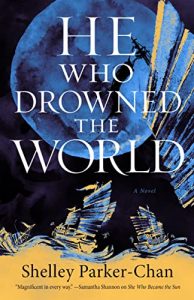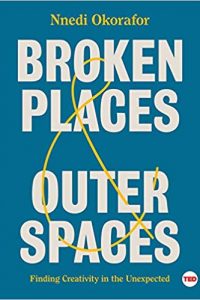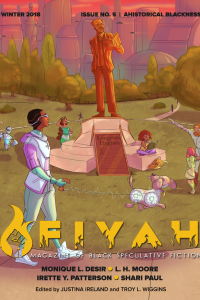Liz Bourke Reviews He Who Drowned the World by Shelley Parker-Chan
 He Who Drowned the World, Shelley Parker-Chan (Tor 978-1529043433, £20.00, 496pp, hc) August 2023.
He Who Drowned the World, Shelley Parker-Chan (Tor 978-1529043433, £20.00, 496pp, hc) August 2023.
Shelley Parker-Chan’s highly accomplished debut novel, She Who Became the Sun, first volume in the Radiant Emperor duology, came out to great acclaim in 2021. Set in a lightly fantasised version of historic China at the period of upheaval and civil war around the transition between the Yuan and Ming dynasties, it focused on the rise to leadership of Zhu Chongba (inspired by, and sharing a name with, the historic person who became the Hongwu Emperor, first of the Ming dynasty) and on the revenge quest of the entirely fictional Ouyang, a eunuch in service to the Mongol Yuan, who has bent his entire life (and will destroy everything good in it) to achieve the revenge he believes he owes to his ancestors, who were executed by the Yuan. In the course of their different ambitions, Ouyang and Zhu clash: they are each other’s warped mirrors, perhaps bound by fate.
Parker-Chan genderbent history: in this telling, Zhu Chongba was born in a woman’s body, and she lives as a man in order to achieve the greatness she desires for her destiny. (‘‘She’’ is the pronoun Zhu uses for herself, though her gender identity seems a rather liminal question: I suspect Zhu’s gender would be by preference emperor.)
She Who Became the Sun was the first volume of a duology. He Who Drowned the World is the concluding volume of the pair, and it picks up where its predecessor left off. Zhu has advanced to leadership of one set of rebels, publicly claiming the Mandate of Heaven and, while militarily weak, is positioning herself to fight the other claimants for the imperial throne, while Ouyang has killed the man he loved in service of his revenge and positioned himself to lead an army against the Great Khan in order to complete his vengeance. Meanwhile Wang Baoxiang, whose plotting in the background of She Who Became the Sun proved extremely significant, has moved to court, where his long game is at last coming to fruition. He, too, has the outward signs of the Mandate of Heaven, and he means to become emperor and destroy and debase the society that despised him for his effeminacy, his apparent sexual interest in other men, and his dislike of the warrior arts. It’s his revenge on his family and all of society, a revenge that’s already seen him participate in his brother’s murder, and he’ll destroy himself to accomplish it. His ally in this is Madam Zhang, matriarch at the heart of the Zhang family, cuckolding a weak husband with his stronger, more competent brother: she wants to rise, and she, too, will use any tool she can to achieve it.
He Who Drowned the World is an incredibly compelling novel, vividly written, with fascinating thematic arguments about gender and power – there are entire essays to be composed on that aspect of this novel alone – and with a startlingly fresh approach to combining the fantastical with the historical. (At least for English-language media. My exposure to Chinese-language historical-fantastical drama is limited, but my impression there suggests that Chan may be drawing on existing genre models.) It could also be accurately subtitled Unlikeable People Making Really Terrible Life Choices.
Of all the characters who aim at the imperial throne, either to enthrone themselves or destroy its occupant, only Zhu and Baoxiang even briefly contemplate the effects of their actions on other people in a way that suggests they see other people as people. Ouyang is sunk so far into tunnel-vision that other people are merely obstacles, with the brief exception of Zhu. Madam Zhang’s considerations are all about status: she’s divorced even herself from actual feelings that have more to them than pride and ambition. Baoxiang will not be deterred, even when brief spurts of empathy make him feel bad: he loathes himself even more, perhaps, than he hates the world, so feeling awful about his decisions is all part of the course he’s set himself. Zhu will occasionally hesitate, when it comes to the extremely limited number of people that she cares about, or briefly feel bad in the aftermath, but regrets, much like fear, doubt, and second thoughts, have limited purchase on Zhu’s psyche. These characters are so fascinating in part because the reader can always see the moment where they could have made a different (less awful, less ethically broken, less self-destructive, emotionally healthier) choice. Parker-Chan takes their characters right up to the precipices where they could back away and choose differently… and pushes them over the edge in order to explore the consequences.
They’re compellingly disastrous consequences.
Thematically, Parker-Chan is engaged in an argument about the point of ambition. Everyone who attains their desires (power, revenge), save Zhu, finds that the choices they have made to get there have either been made pointless, or that the accomplishment of their desires has not been worth the price. They did not want to do anything constructive with that power. Zhu, Parker-Chan argues, does: Zhu, a queer person, a person with disabilities, a former outcast who is unashamed of who and what she is will change the world rather than change herself; will use the power of the imperial throne to make things different for women, for the effeminate, for people living queer lives in queer bodies. He Who Drowned the World ends with the door about to open on Zhu’s reign.
I have complicated reactions to novels that use the names of real historic figures while diverging significantly from what we know about the historical outcomes and consequences of those figures’ actions. Alternate history and historical fantasy are both counterfactual histories, and taking counterfactual views on history is actually important to its study: it makes the historian, or even the general reader, re-examine their assumptions about causation. (It’s hard to overturn the teleological bent in history, the idea that certain choices necessarily led to the outcome that was in fact produced, on account of we live in the aftermath of those outcomes, not alternate ones.) A historically inspired novel like this one, which according to the author has ‘‘taken every liberty imaginable’’ and that ‘‘was never telling a story about those specific historical events,’’ but rather ‘‘about individuals within a system that denies them aspects of their personhood – whether that be their sexuality, or their gender, or even their right to life’’ still has a relationship with history. (Quotes from ‘‘Q&A: Shelley Parker-Chan, Author of She Who Became the Sun’’, The Nerd Daily, 2021; <thenerddaily.com/shelley-parker-chan-author-interview>, accessed 7/11/23.) Invoking historical figures by name in a novel invites the reader to compare the fictional version (however loose the relationship may be) with the real. In Zhu’s case, history does tell us that the Hongwu emperor was a reforming sort of emperor….
At the end of the Radiant Emperor duology, I’m left with a significant sense of ambivalence about how it connects its characters, Zhu in particular, to a historical moment and to historical people. This is a powerful and empowering sort of fantastical reimagining, projecting queer experience onto some of the most powerful figures of history. Queering history in a very literal sense. And the fantastical elements serve to remind the reader that this is not, in fact, real history. At the same time, however, the historical roots of Zhu, her position as occupying the same place and the same name as the Hongwu emperor, seems to me to undermine part of the novel’s thematic arguments about the point and value of ambition and of power itself: it is difficult to feel satisfied that Zhu will live up the socially radical promise inherent in her unapologetic ascent to power as herself, because if Zhu is a version of the first Ming emperor, we know that the Hongwu emperor did not fundamentally alter either the nature of empire or the heterosexist, patriarchal constraints of the society over which he ruled, and some of his reforms, intended to protect the peasantry, arguably backfired. Entrenched systems resist revolutionary change.
This sense of satisfaction undermined, of triumph carrying the seeds of its own future form of tragedy, may be exactly what Parker-Chan aimed for in their conclusion. They’re a writer of very great skill, after all. Perhaps the reader is supposed to come away with that ambivalence about Zhu’s triumph, to anticipate that Zhu, too, will fail to find power worth its price in the end. Ultimately, I think, whether you find He Who Drowned The World to close on the cusp of imminent triumphant uplift, or of delayed downfall, depends in large part on how you read its relationship with history. I haven’t yet completely made up my mind where I fall: I suspect I’ll still be thinking about this duology in a decade’s time. In either case, He Who Drowned the World is a worthy successor to She Who Became the Sun: a vivid and entertaining novel whose characters, for all their flaws, are never less than wholly fascinating.
Liz Bourke is a cranky queer person who reads books. She holds a Ph.D in Classics from Trinity College, Dublin. Her first book, Sleeping With Monsters, a collection of reviews and criticism, is out now from Aqueduct Press. Find her at her blog, her Patreon, or Twitter. She supports the work of the Irish Refugee Council and the Abortion Rights Campaign.
This review and more like it in the August 2023 issue of Locus.
 While you are here, please take a moment to support Locus with a one-time or recurring donation. We rely on reader donations to keep the magazine and site going, and would like to keep the site paywall free, but WE NEED YOUR FINANCIAL SUPPORT to continue quality coverage of the science fiction and fantasy field.
While you are here, please take a moment to support Locus with a one-time or recurring donation. We rely on reader donations to keep the magazine and site going, and would like to keep the site paywall free, but WE NEED YOUR FINANCIAL SUPPORT to continue quality coverage of the science fiction and fantasy field.
©Locus Magazine. Copyrighted material may not be republished without permission of LSFF.






